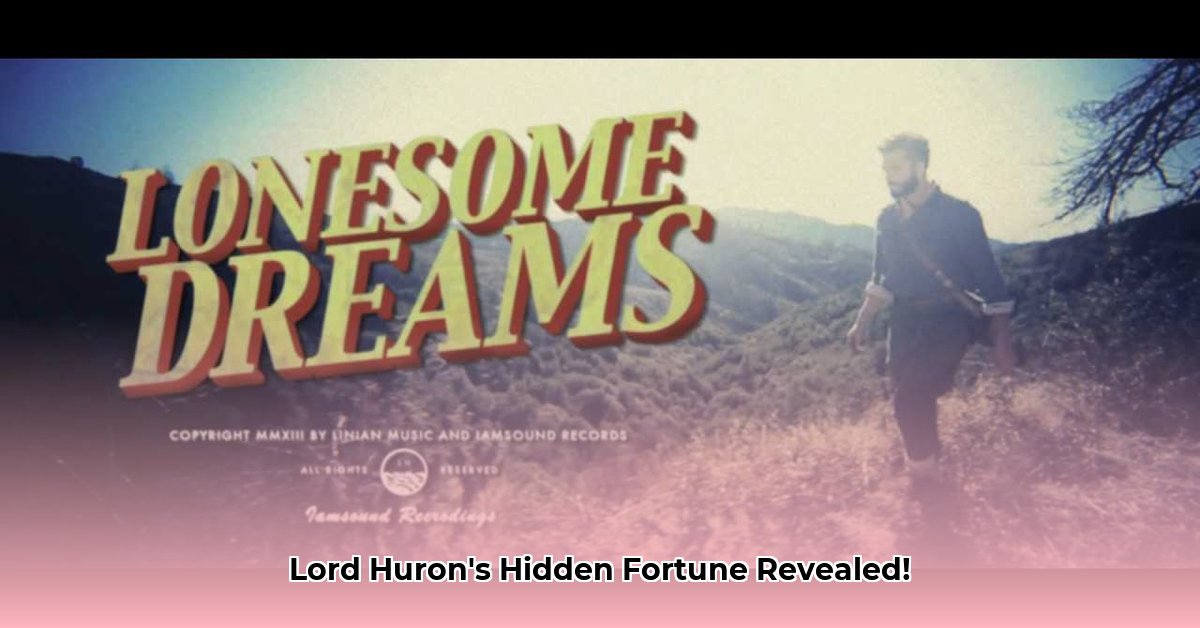
Ben Schneider, the enigmatic mind behind Lord Huron, hasn't just crafted haunting melodies; he's also built a substantial fortune. The viral explosion of "The Night We Met," propelled by its inclusion in 13 Reasons Why, is a potent symbol of his success, but it's merely one piece of a larger, intricate financial puzzle. This isn't a simple tally of dollars and cents; it's a narrative of artistic vision, strategic decision-making, and navigating the volatile currents of the music industry.
From Indie Darling to Mainstream Success
Lord Huron's early albums, like Lonesome Dreams, cultivated a dedicated fanbase, laying a crucial foundation. However, Strange Trails, selling a remarkable 18,000 copies in its opening week, marked a pivotal moment. The album, particularly its unforgettable lead single, significantly boosted his income, showcasing the power of impactful artistry. This wasn't simply luck; it was the culmination of deliberate creative choices and a steadily expanding audience enthusiastically awaiting each new release. But how much did this initial success translate to financially? While precise figures remain elusive, the sheer volume of sales suggests a significant financial injection.
The Unexpected "13 Reasons Why" Phenomenon
The haunting strains of "The Night We Met" resonated deeply with audiences, becoming an unexpected cultural touchstone thanks to its inclusion in Netflix's 13 Reasons Why. This wasn't a fortunate accident but a masterclass in strategic exposure. Licensing deals of this magnitude are exceptionally lucrative, injecting substantial funds into Lord Huron's coffers and propelling his name into the mainstream consciousness. The impact was undeniable and likely exponentially increased his earning potential. How many aspiring musicians dream of such a serendipitous – yet strategically planned – career boost?
Building a Diverse Empire Beyond Music
Recognizing the inherent volatility of the music industry, Schneider shrewdly diversified his income streams. Lord Huron's extensive tours, likely generating $1–$1.5 million per tour, constitute a substantial portion of his financial success. Merchandise sales, estimated at roughly $200,000 annually, contribute a consistent supplementary income stream. Furthermore, it's probable that he has undertaken strategic investments, potentially in real estate and the stock market, further securing his long-term financial stability. It’s this holistic approach, this calculated diversification, that truly distinguishes his financial strategy.
Navigating the Industry's Volatility: Challenges and Triumphs
The music industry is notorious for its unpredictable nature. One moment, an artist is riding high; the next, they face unexpected challenges. However, Schneider appears to have anticipated this, mitigating risk with his diversified approach. While setbacks were inevitable, his calculated risk-taking has clearly yielded substantial rewards. This financial success is a testament to both artistic skill and astute financial planning.
Estimating Lord Huron's Net Worth: The Elusive Figure
Pinpointing Lord Huron’s exact net worth is inherently difficult. As a private individual, the precise details remain confidential. Various sources offer estimates that vary widely—from more conservative figures that require further validation to considerably higher projections. The fluctuating nature of income within the music industry significantly complicates any attempt at definitive calculation.
The Future’s Soundtrack: Continued Success and Growth
Lord Huron's future financial trajectory depends on several crucial factors. Maintaining consistent output of high-quality music that resonates with audiences remains paramount. A robust touring schedule will continue to provide substantial income, and strategic brand management—including calculated collaborations—will be instrumental in maintaining relevance and attracting new fans. The interplay of these factors will undoubtedly shape his future net worth.
Key Factors Influencing Lord Huron's Net Worth:
- Album Sales: Formed the foundation of his early success.
- Extensive Touring: A major and ongoing source of revenue.
- Strategic Licensing Deals (e.g., 13 Reasons Why): A pivotal moment of substantial financial growth.
This journey is far from over. While the exact figure remains elusive, the narrative of Lord Huron’s financial success serves as a compelling case study in artistic vision, smart business acumen, and the enduring power of diversification in a demanding industry. It’s a story of careful planning, seizing opportunities, and ultimately, building a lasting legacy.